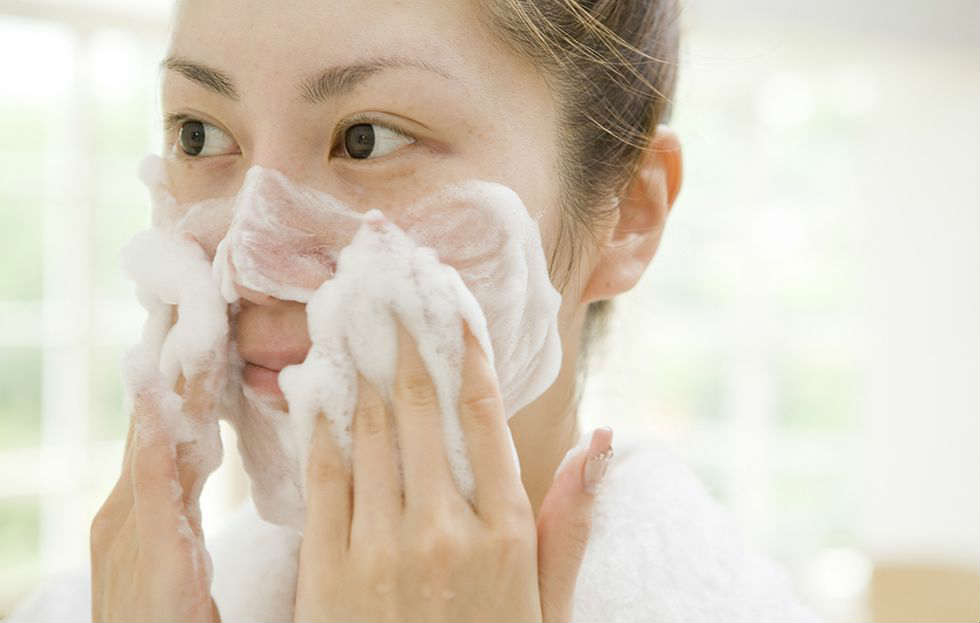Skin Care : What happens when you stop washing your face
Skin Care
Let’s face it, as crucial as we all know it is to remove our makeup each and every night before bed, there are still times when we slip between the sheets with a 12-hour face of makeup, ultimately smudging onto our pillows and sheets.
While waking up and seeing eyeliner on your pillowcase is enough to be an annoyance and spotting a glaring breakout when you look in the mirror can seem like a curse, at the end of the day, it all comes down to the most important step of your skin-care routine: the one that can make a world of difference if you skip. And it’s that very idea that led us to find out what would really happen if you just up and stopped washing your face — completely.
What happens when you skip cleansing altogether?
“What happens when you stop washing your face depends a lot on the condition of your skin — oily, dry, combination — and what types of things you usually put on and get on your face,” Soren White, a board-certified dermatologist in New York City, tells Allure.
![]() That’s because if you have oily skin and completely stop washing your face, you can see a dramatic rise in breakouts and even more oil production. Whereas, if you have dry skin and completely stop washing your face, you may find that it just continues to look dryer and duller as time goes on. That said, it’s important to look at the benefits of cleansing as a whole to clearly get a gist of what can happen if you quit the essential skin-care step.
That’s because if you have oily skin and completely stop washing your face, you can see a dramatic rise in breakouts and even more oil production. Whereas, if you have dry skin and completely stop washing your face, you may find that it just continues to look dryer and duller as time goes on. That said, it’s important to look at the benefits of cleansing as a whole to clearly get a gist of what can happen if you quit the essential skin-care step.
So, why is cleansing so important?
“Cleansing your face removes makeup, oil, dirt, and other debris,” Sejal Shah, a board-certified dermatologist in New York City, tells Allure. “Even if you don’t wear makeup, the skin on your face comes into contact with residue from other skin-care products(moisturizers, sunscreen, and so on), pollutants, microbes, dirt, and other debris — not to mention oils, sweat, and dead skin cells from the skin.”
Without cleansing, it’s this buildup on the skin that can lead to textural issues and poor luminosity, especially because it prevents your skin from being able to renew itself overnight, says White. As if that’s not enough to make you want to wash, Shah says it loud for those in the back. “This buildup can potentially clog the pores resulting in dry, irritated skin, and even acne,” she says. “This can lead skin to become itchy, resulting in scratching, potentially leading to breaks in the skin, which can then increase the risk of infection.” Talk about a domino effect, huh?
Forgoing cleansing can impact the rest of your routine
Oh, but it doesn’t stop there. Not cleansing can also mean that every can’t-live-without skin-care product you meticulously layer onto your face won’t do squat. “They may not work effectively because they have to penetrate through a layer of impurities,” Shah says.
So, at this point you’re probably not even reading anymore having realized you need to go wash your face, stat. But, in the event that you’re still with me, hear me out: Just because cleansing your face is so detrimental to the health and appearance of your complexion doesn’t mean you should overdo it. With so many products on the market these days, some folks might think they need to double- and triple-cleanse their faces morning and night just to get by. That’s not the case.
Yes, you can over-cleanse
“On the flip side of regularly cleansing, washing with soap or even a gentle cleanser is not always necessary,” White says. “Over-washing is one of the major causes of dry, irritated skin, especially during winter months.” That said, if your skin is typically dry but not necessarily dirty, rinsing with water — and avoiding cleanser — can help restore the skin’s natural oils, which are needed to maintain hydration and prevent irritation.
As for other skin types, it all comes down to just how much oil is present on your face, as well as what type of environment you live in. Typically, the more urban your environment, the more cleansing you can get away with, but even still, you shouldn’t introduce a cleanser into your routine more than twice a day. On the converse, the more rural your surroundings, so long as you’re not spending your days rolling around dirt- and pollen-filled fields, the less cleansing you can get away with.
Make cleansing a habit
Long story short, what would happen if you just stopped washing your face would may be not be something you’d enjoy staring back at you in the mirror on a daily basis. (Or maybe you wouldn’t mind, which is totally OK, too.) But, generally speaking, in order to avoid dryness, dullness, and everything else that comes long with skipping the cleanse, pick your favorite cleanser, put it in plain view, and, no matter how late it is, how tired you are, or how many drinks you’ve had, always make time to rinse away the day’s makeup, dirt, and impurities. Trust me, your skin will thank you.
In addition to what products you do or don’t use, dermatologists say healthy-looking skin depends on a subtle alchemy of factors including genetics, skin type, age, hormone and activity levels as well as your environment.
This makes a one-size-fits-all skin solution impossible, says Fayne Frey, MD, a dermatologist in West Nyack, New York. “Our culture has us believing that cleansing morning and evening is best, but there is no consensus on how often a woman with healthy skin should wash her face with a cleanser,” said Frey. “I’ve visited parts of the world where there is no running water and women never wash their faces. They have no increase in skin infection or other skin conditions, and many have beautiful, soft, moisturized skin.”
Cleansers can aggravate your skin.
By the time we hit 30, our bodies start producing less oil, says Papantoniou. In turn, you may start noticing that you can’t handle the cleanser you used in your 20s and that “your skin is getting dried out even though you are using the “best” moisturizers.” If you’ve noticed any of these things, it may be time to lay off the cleansers.
The bottom line: Do what works for you.
Most dermatologists agree that for those seeking a low-maintenance plan, using a cleanser at night and just water in the morning is a reasonable option. “This is the most common recommendation I provide,” says Papantoniou. “I think it’s very logical to remove makeup and buildup of oils and bacteria in the evening [with a mild cleanser], and in the morning a gentle rinse with water should be enough to start the day.”
But ultimately, it’s up to the individual. “In terms of whether we should stop washing our faces altogether, the answer will most likely always be no,” says David Lortscher, MD, a San Diego dermatologist. “But washing your face with a cleanser can be skipped every once in awhile. Some people prefer to simply rinse their face with water and no cleanser. If this works for you, then no harm done: It’s not necessary to use a cleanser every time you wash your face.”




























